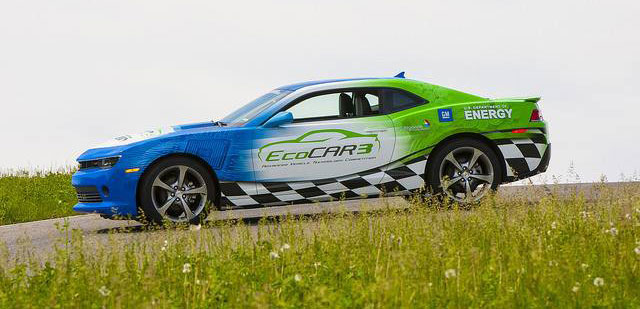
Colorado State University’s Thomas Bradley has received a U.S. Department of Energy fellowship to support his work with CSU’s EcoCar 3 student team.
Bradley, an associate professor of mechanical engineering and associate director of the College of Engineering Systems Engineering program, advises the EcoCar 3 team, now in year two of a four-year, DOE-sponsored competition to design an energy-efficient Chevrolet Camaro. Bradley is also a faculty member in the CSU Energy Institute. The students are designing a high performance, high efficiency parallel plug-in hybrid electric vehicle for the competition.
DOE automotive engineering fellowship
Bradley was selected for a 2015 DOE Applied Automotive Engineering Fellowship. The fellowship includes funding to develop a learning module that improves the capabilities and performance of EcoCar programs at 16 universities across the US and Canada. His new module should improve the quality and industrial relevance of the students’ mechatronic system development process.
Bradley’s fellowship is aimed at improving the learning experience of the EcoCar students from start to finish. Typically, at the beginning of each semester, students document mechatronic system requirements for the vehicle. These system-level requirements describe broad fuel economy goals, objectives for energy minimization and constraints on mass or size.
Students are taught to develop and document these requirements, but the process of requirements management is more abstract and is often not exemplified in senior design or EcoCar projects. These requirements are often not revisited or referred to until the end of the project. This means high-level requirements can’t be tested until very late in the project, and requirements also can’t be linked with other specifications along the way.
Improved student learning
Supported by the fellowship, Bradley aims to correct this problem by revamping the way that College of Engineering undergraduate students are taught to develop and manage engineering requirements. By presenting the process from start to finish using concrete, automotive engineering examples, students should be better equipped to develop, manage and validate requirements to design complicated electro-mechanical systems.
“I believe that this will represent a significant improvement to the more philosophical and abstracted approach that has been utilized in CSU’s – and other universities’ – undergraduate curriculum,” Bradley said.